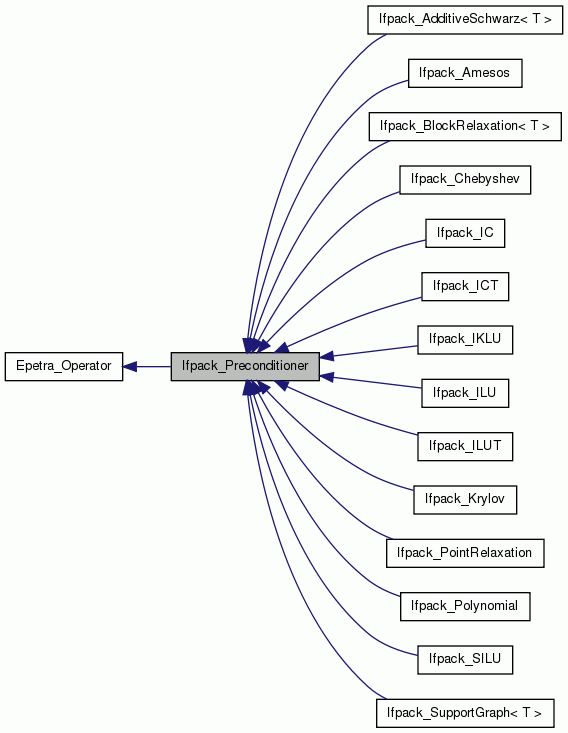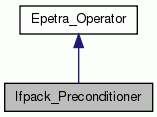|
IFPACK
Development
|
Ifpack_Preconditioner: basic class for preconditioning in Ifpack. More...
#include <Ifpack_Preconditioner.h>


Public Member Functions | |
| virtual int | SetParameters (Teuchos::ParameterList &List)=0 |
| Sets all parameters for the preconditioner. | |
| virtual int | Initialize ()=0 |
| Computes all it is necessary to initialize the preconditioner. | |
| virtual bool | IsInitialized () const =0 |
| Returns true if the preconditioner has been successfully initialized, false otherwise. | |
| virtual int | Compute ()=0 |
| Computes all it is necessary to apply the preconditioner. | |
| virtual bool | IsComputed () const =0 |
| Returns true if the preconditioner has been successfully computed, false otherwise. | |
| virtual double | Condest (const Ifpack_CondestType CT=Ifpack_Cheap, const int MaxIters=1550, const double Tol=1e-9, Epetra_RowMatrix *Matrix=0)=0 |
| Computes the condition number estimate, returns its value. | |
| virtual double | Condest () const =0 |
| Returns the computed condition number estimate, or -1.0 if not computed. | |
| virtual int | ApplyInverse (const Epetra_MultiVector &X, Epetra_MultiVector &Y) const =0 |
| Applies the preconditioner to vector X, returns the result in Y. | |
| virtual const Epetra_RowMatrix & | Matrix () const =0 |
| Returns a pointer to the matrix to be preconditioned. | |
| virtual int | NumInitialize () const =0 |
| Returns the number of calls to Initialize(). | |
| virtual int | NumCompute () const =0 |
| Returns the number of calls to Compute(). | |
| virtual int | NumApplyInverse () const =0 |
| Returns the number of calls to ApplyInverse(). | |
| virtual double | InitializeTime () const =0 |
| Returns the time spent in Initialize(). | |
| virtual double | ComputeTime () const =0 |
| Returns the time spent in Compute(). | |
| virtual double | ApplyInverseTime () const =0 |
| Returns the time spent in ApplyInverse(). | |
| virtual double | InitializeFlops () const =0 |
| Returns the number of flops in the initialization phase. | |
| virtual double | ComputeFlops () const =0 |
| Returns the number of flops in the computation phase. | |
| virtual double | ApplyInverseFlops () const =0 |
| Returns the number of flops in the application of the preconditioner. | |
| virtual std::ostream & | Print (std::ostream &os) const =0 |
| Prints basic information on iostream. This function is used by operator<<. | |
 Public Member Functions inherited from Epetra_Operator Public Member Functions inherited from Epetra_Operator | |
| virtual int | SetUseTranspose (bool UseTranspose)=0 |
| virtual int | Apply (const Epetra_MultiVector &X, Epetra_MultiVector &Y) const =0 |
| virtual double | NormInf () const =0 |
| virtual const char * | Label () const =0 |
| virtual bool | UseTranspose () const =0 |
| virtual bool | HasNormInf () const =0 |
| virtual const Epetra_Comm & | Comm () const =0 |
| virtual const Epetra_Map & | OperatorDomainMap () const =0 |
| virtual const Epetra_Map & | OperatorRangeMap () const =0 |
Ifpack_Preconditioner: basic class for preconditioning in Ifpack.
Class Ifpack_Preconditioner is a pure virtual class, and it defines the structure of all Ifpack preconditioners.
This class is a simple extension to Epetra_Operator. It provides the following additional methods:
It is required that Compute() call Initialize() if IsInitialized() returns false. The preconditioner is applied by ApplyInverse() (which returns if IsComputed() is false). Every time that Initialize() is called, the object destroys all the previously allocated information, and re-initialize the preconditioner. Every time Compute() is called, the object re-computed the actual values of the preconditioner.
Estimating Preconditioner Condition Numbers
The condition of a matrix \( B\), called \( cond_p(B)\), is defined as \( cond_p(B) = \|B\|_p\|B^{-1}\|_p\) in some appropriate norm \( p\). \( cond_p(B)\) gives some indication of how many accurate floating point digits can be expected from operations involving the matrix and its inverse. A condition number approaching the accuracy of a given floating point number system, about 15 decimal digits in IEEE double precision, means that any results involving \( B\) or \( B^{-1}\) may be meaningless.
Method Compute() can be use to estimate of the condition number. Compute() requires one parameter, of type Ifpack_CondestType (default value is Ifpack_Cheap; other valid choices are Ifpack_CG and Ifpack_GMRES).
While Ifpack_CG and Ifpack_GMRES construct and AztecOO solver, and use methods AZ_cg_condnum and AZ_gmres_condnum to evaluate an accurate (but very expensive) estimate of the condition number, Ifpack_Cheap computes \(\|(P)^{-1}e\|_\infty\), which is only a very crude estimation of the actual condition number. Note that this estimated number can be less than 1.0. However, this approach has the following advantages:
If this estimate is very large, the application of the computed preconditioner may generate large numerical errors. Hence, the user may check this number, and decide to recompute the preconditioner is the computed estimate is larger than a given threshold. This is particularly useful in ICT and RILUK factorizations, as for ill-conditioned matrices, we often have difficulty computing usable incomplete factorizations. The most common source of problems is that the factorization may encounter a small or zero pivot, in which case the factorization can fail, or even if the factorization succeeds, the factors may be so poorly conditioned that use of them in the iterative phase produces meaningless results. Before we can fix this problem, we must be able to detect it.
Ifpack_Preconditioner objects overload the << operator. Derived classes should specify a Print() method, that will be used in operator <<.
Definition at line 142 of file Ifpack_Preconditioner.h.
 1.8.5
1.8.5